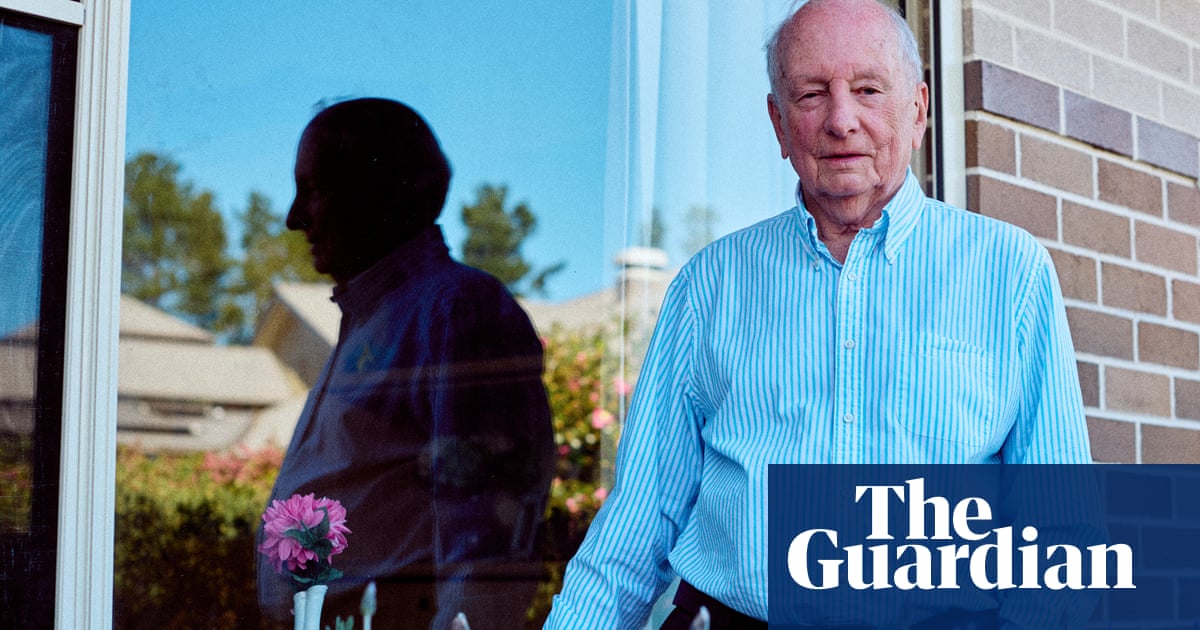As a former prison officer, I have opened thousands of cell doors. For almost a decade, I unlocked cells in residential blocks, healthcare units, first night centres, close supervision centres and segregation units. The twist and click of a key in the lock came to feel like background noise to me. But there are some occasions I remember more vividly than others. Sometimes the person inside wasn’t so keen on coming out.
One of those challenging incidents took place a few years ago, while I was on shift in a segregation unit in a busy London jail. Prisoners are sent to the seg for a variety of reasons – fights, assaults on staff, possession of contraband – but normally for no longer than a week or two. The seg was made up of 18 single cells spread over two storeys. I was in a team of six, all of us in full riot gear. We were moving a mentally ill prisoner who had destroyed his cell and then flooded it with sewage because he believed we were planning to implant a chip in his brain. His story is not an isolated one. In 2024, the chief inspector of prisons published a report showing that prisons are having to wait an average of 85 days to send acutely mentally unwell prisoners to secure hospitals.
The government has responded to the overcrowding crisis by letting some prisoners out early. Given that prisons were operating at 99.9% capacity, I’m not sure there was any other option. But the early release scheme isn’t a long-term solution. Data published by the Ministry of Justice has shown that recalls to prison have increased by 42% since the early release scheme was implemented. No prison officer in the country will be surprised by that. According to the most recent figures, assaults on prison staff occur almost hourly, suicides by prison inmates have risen by nearly 25% and 70% of inmates feel unsafe. But numbers don’t do justice to the human impact of all this. They can’t show you what it’s really like.
Officers are on the frontline every day, struggling to keep inmates and themselves safe. When there is a fight, someone has to break it up. A suicide attempt: someone must do CPR. A hostage incident: someone needs to negotiate. And when there is a person in “the box” – a single empty cell within the segregation unit – someone has to be the one to unlock that door. Someone has to be the one holding the shield. And, at the end of the day, that person puts on their coat and walks home.
Back in January 2016, I lived no more than five minutes from the category B prison in London where I worked. I’d been a prison officer for a few years by that point, but the uniform still felt bulky and ill fitting. When I arrived, walking through the gatehouse and past the lockers crammed with batons and cuffs, the air felt just as cold inside the prison as it did outside. But the smells were nastier, particularly in the unit I’d been assigned to that day.
In the segregation unit there were pools of shit leaking out from under the white screens erected opposite cell 6. The screens were in place to prevent faeces and urine hitting officers as they walked past. For the most part they were effective. But if a prisoner was persistent enough, they could aim it just right so when the mixture of shit and piss and water hit the screens, it slid down and under. Mensah (not his real name), a tall prisoner in his 50s, had smashed the observation panel and was posting what he affectionately termed “shit parcels” through it several times a day.
He’d had enough practice at dirty protests. He was well known in all the London jails. He went from seg to seg destroying each cell he was put in, immersing broken furniture in the flood he’d caused by smashing the sink and taking apart the plumbing. He’d done a long time in Broadmoor, the high-security psychiatric hospital, but had eventually been considered stable enough to be returned to prison. Sadly, his period of stability did not last long. He was clearly mentally unwell, more than happy to live in a sea of his own detritus and convinced that almost every passing female officer was his wife. “What the fuck are you doing working in this place, Marie?” he would scream at every woman he saw.
It wasn’t just the smell that hit you as soon as you walked into the seg. It was the noise too. The other seg prisoners would kick their cell door repeatedly, bang after bang after bang that reverberated throughout the unit, so relentless that it felt like the walls were shaking. They’d shout and bang and smash their observation panel, shards of glass sometimes exploding from the rectangular window in their cell door.
The seg was like a smaller version of a residential wing. There were cells, an exercise yard, a servery for meals, and a desk on the ground floor where staff completed paperwork and answered phone calls. An office on the ground floor was reserved for what were known as adjudications. Each weekday the duty governor would sit behind a polished mahogany table, with a painting of the queen hanging above them, to hear the charges for which officers around the jail had placed prisoners on report: possession of a phone, fighting, assault, destroying prison property, threatening and abusive behaviour. On the day of their hearing, the prisoners would file noisily into the seg before being locked in a holding room to wait their turn. One by one they walked into the office to see the governor. But most of them didn’t have to stay on the seg. Almost all returned to the wing, carrying a punishment as well as their paperwork: loss of association (banned from mixing with others) maybe, or denied access to the prison shop, known as the canteen, for a couple of weeks.
I remember thinking that it seemed particularly unfair to give a prisoner seg time given the smells emanating from Mensah’s cell. The two prisoners in the cells either side of him had been returned to their wing for the rest of their confinement period.
In the seg, at the far end of the ground floor landing, was a cell known as “the box”. It was just an empty room. No bed, chair, or toilet. The most violent and disruptive prisoners were held in there, though not for long. Almost as soon as someone was put in the box, governors were making plans to try to have them moved back to a normal cell. That’s still the process today. The box is sometimes the safest place for a prisoner to be; they have no access to materials they could use to harm themselves or others. But locking a man in a literal box is no one’s idea of rehabilitation. It’s a last resort.
There was no one in the box that day. There were 16 men locked in their cells, awaiting a regime of phone call, exercise and shower. Some weren’t bothered about going out in the yard, but most wanted a shower and a phone call. So the staff were tasked with facilitating a minimum of 16 individual regimes throughout the day while simultaneously making sure that no two prisoners were unlocked at the same time and ensuring that each man was checked on at least once an hour. It was a busy and challenging unit. Even if prisoners were considered safe to go on the yard together, they had to be escorted there one at a time by a minimum of two officers. This was problematic in 2016, but with the staffing crisis as dire as it is today, it is impossible to imagine how such a regime can be delivered without compromising both staff and prisoner safety.

In very exceptional circumstances, a prisoner would be considered so dangerous that they were only unlocked by a senior officer plus six officers, each wearing a full kit of blue fire-retardant overalls, leg guards, arm guards, balaclava, helmet and stab vest. When I joined the prison service in 2012, stab-proof vests didn’t exist for officers. Nor did Pava – pepper spray that was rolled out in all-adult male prisons in 2020. The use of Pava is contentious, but at the very least it recognises the increased danger facing prison officers today. Staff assaults were once comparatively rare. That is no longer the case. But while physical support measures may have increased, the emotional support available to frontline prison staff is lacking. Analysis released last year found that prison and probation staff took the equivalent of more than 770 years’ worth of mental health sick leave in 2023.
That particular day, I made my way towards the unit with an experienced seg officer named Rob (he asked me not to use his last name). He was a good friend of mine. When a prisoner from the wing I worked on was being segregated, it was almost always Rob who would be there to meet us. It was almost always him I saw after a serious fight or assault. Almost always him waiting on the concrete steps leading to the segregation unit to escort the cuffed man inside. And I was relieved every time. Rob knew the seg inside out, knew all the paperwork and adjudication charges and regime timings. And he knew the men too, the ones who were regulars, who handled seg life far better than they did being on the wing. Seg officers were often disliked by prisoners because they represented an even closer form of confinement. But Rob was respected.
We walked past one of the wings housing more than 300 men. Most of the cell windows looking out on to the green remained intact. The majority of these prisoners were employed as barbers, servery workers or corridor cleaners. The nature of their jobs meant that most of them were out of their cells a lot, so they rarely felt the need to smash things. From the outside, there were no obvious signs announcing the approach to the segregation unit unless you knew what to look for. As we stepped on to the path outside, the grass rustled with the noise of rats picking through the litter. Above us, the cell windows were smashed. From inside came the constant thumping of men booting their door.
At least one seg prisoner was not kicking his door. Instead he was dangling his legs out of the window. Most prisoners destroyed their surroundings because they were bored, fed up, angry. But Maxim (not his real name) wasn’t angry. He was cheerful, if anything. He waved at us, then shouted something in Russian. He was something of a celebrity in the prison, having been repeatedly segregated for damage to prison property. That wasn’t an offence which would normally warrant segregation, but with Maxim it felt like the only option left. Because the damage he was causing wasn’t ordinary. He wasn’t breaking his furniture or ripping up bedsheets. He had turned his cell into a kitchen. It wasn’t entirely clear how. He’d removed the base plates from prison-issue kettles and wired them up to the light fitting to make miniature stoves.
An officer on night patrol caught him doing this in the early hours of the morning, so his electricity had been switched off. Maxim wasn’t hurting anyone as he set about making himself a meal, but it was a fire risk. For most prisoners, losing their electricity supply would mean game over: no cup of tea, no TV, no lights. And yet when the officer walked past Maxim’s cell again an hour or so later, the lights were back on. Maxim was stretched out on his bed watching TV with a cup of hot tea in his hand. Again, no one was really sure how he’d done it. Rob and I rounded the corner beneath Maxim’s window and climbed the steps to the segregation unit. The moment we were inside, the smell was all I could think about. The kind of smell that gets into your throat and makes your eyes water. I rarely wore my balaclava for planned removals, but that day I couldn’t get it on quick enough. I changed into my control and restraint kit in the adjudication room, the queen smiling at me as I slammed the visor of my helmet down.
Mensah knew we were coming He’d done this many times before. We stopped outside his door – six of us, ready to go. Rob held the shield before him, elevated at a slight angle. I stood slightly behind and to the right of him while another officer mirrored me on the left. Rob’s voice was loud and steady.
“Mensah, go to the back of your cell. Hands on your head.”
When he spoke, the seg quietened. Prisoners peered through the crack between their cell door and the doorframe.
“Yeah, guv, I already am,” said Mensah. “It’s all good, guv. I won’t fight.”
Rob nodded at the senior officer, who reached round the shield and unlocked the door, then stepped back immediately. Rob leaned forward and pushed the cell door open. From my position, I could just about see Mensah stood at the back of the cell, facing the wall, wearing only boxers and socks. The cell was a mess. Broken table legs were scattered about the floor, bits of paperwork floated in the water from the smashed sink, a mug full of watery shit was balanced on the end of the bed.
Mensah turned. With his hands still on his head, he started walking towards us, his feet occasionally knocking against furniture and detritus.
“Keep going. Keep your hands on your head.”
Rob and Mensah were going through the motions. But they both knew how this would go. Mensah took small steps, his smile getting wider. He was inches from the shield. As instructed, Mensah took his hands from his head, slowly. But he didn’t turn around. The tension was palpable. I stayed in position. The three staff behind pressed in closer.
“Mensah,” said Rob.
Any second.
I saw Mensah’s right fist as it clenched. Rob held the shield firm.
And then, bang. Mensah punched the shield. Rob dropped his head and drove the shield forward, pushing Mensah back into the cell. In a second the steady control of command and compliance was gone, everyone was splashing around, and Mensah was yelling about killers and spies and government agents. He was spinning and kicking, his limbs flailing and ours too as we tried to grab hold of him. He slipped in the water and crashed to the ground. Two of us managed to get hold of his arms while Rob supported his head to make sure his nose and mouth stayed clear of the stinking water. The noise around us was deafening. The other prisoners were kicking their doors and thumping their kettles against the windows.
When we did eventually get Mensah to his feet, he calmed slightly.
“They’re trying to put metal chips in me,” Mensah said.
“No one is going to hurt you,” Rob said. “We just want to put you in a clean cell. You can’t stay in here. We’re going right next door. The cell is ready.”
“But if the cell is dirty, they can’t get the chips in. If it’s clean, it’s too easy for them.”
Mensah turned and growled at me. But he knew Rob, and even in his confusion he seemed to trust him. His hands were filthy, calloused and swollen and streaked with cuts. As we walked slowly out of the cell, rotating our little unit out of the doorway, I looked back and saw that Mensah had written “fuck govment” on the wall above his bed. But not in pen – he wasn’t permitted to have a pen. He’d written it in his own faeces.
Hard as that job was, I knew I was lucky. My encounter with Mensah was extremely unpleasant, but at least I knew I was safe. I was surrounded by experienced officers who took pride in their work and understood the nuance of the job. Today, that is rare. Nearly half of prison officers resign after less than three years. And I also felt certain that I was doing the right thing. Mensah may not have understood why he needed to leave that cell, but we did. We did our best to keep him safe until he got the help he needed. It is even harder for staff to do the right thing now, when there are so few of them and prisons are so overcrowded, conditions so poor and basic resources so sparse.
Mensah embodied the paradox which so often curdles inside prison staff. He was pitied and yet reviled. Pitied because he lived in his own shit, and no one in their right mind would choose to live like that. Reviled because it was us he threw the shit at. There were many officers who seemed to have endless reserves of resilience, but there were others who were cruel and antagonising, who said things to wind prisoners up behind their door but were nowhere to be seen when it was time for the door to be opened.
Mensah shouldn’t have been in that segregation unit. He shouldn’t have been in prison. He should have been in hospital. But where? When I spoke about his case to a forensic psychologist who had prior experience as an operational prison officer, he said: “We work with what we’ve got.” And what we had was not a lot. A shortage of beds inside medium- and high-security hospitals means a prisoner experiencing acute mental distress might have to wait months to be transferred to a hospital. The staff inside those hospitals do an incredible job, but they couldn’t make the process any quicker. And Mensah had to go somewhere. He was serving an imprisonment for public protection (IPP) sentence for possession of an offensive weapon. He’d first been jailed in 2006. Ten years later, he was still behind bars with no release date, no goals to set, no plans to make. Mensah’s original offence had involved threats but no actual violence. Yet now his violence was real. We were witnessing the impact an indeterminate sentence can have on a person’s mental state.
Mensah was also a prolific drug user. Maybe that made things easier for him, a kind of escape. It certainly wasn’t difficult for him to get hold of the illicit substances. In recent years, drug rehab wings have been introduced in prisons across England and Wales with the intention of breaking prisoners’ addictions. But simply labelling a wing “drug free” is not enough. It is certainly not enough when drones can deliver packages direct to cell windows. The staggering rise in drone incidents in prison demonstrates just what staff are up against. A freedom of information request by the Guardian found there were 1,296 drone incidents at prisons in England and Wales in the 10 months to the end of October 2024, a tenfold increase since 2020.
Prisoners like Mensah aren’t the norm – most men in segregation units will serve their designated seg time and then return to the wings – but nor was it an anomaly. There are men like him in segs up and down the country. Sometimes they reach their release date and there’s no legal reason to hold them any longer, so they’re let out on to the streets, confused and agitated and barely able to manage their own personal hygiene, never mind navigate the outside world. Sometimes they make it to a secure hospital, and after a few months’ treatment they return to prison stabilised, at least temporarily, with the right medication and support.
And so Mensah was moved between the segregation unit and the healthcare unit, spending a few days at a time in each to give the staff a bit of respite before he was transferred to another prison. There he would resume his dirty protests. On one occasion he also pulled all his teeth out. After that he was transferred not to a hospital but to yet another prison.
Investing in prisons means investing in people. That includes the staff. Prisons are made safe by officers who know those environments well, who understand the unique challenges they pose and who have the time to develop relationships with the prisoners in their care. Those skills come with time. Experience won’t come from the three years most prison officers spend in the job before deciding it’s not worth it. The cuts made to public services have been catastrophic. Austerity has stripped our prison service to the bone. And yet while many would prefer to look away, there are those who keep showing up, despite knowing exactly what they will face when they get there.
By the end of 2021, I’d had enough. Staffing shortages had made the job too unsafe. We were at the point of letting prisoners out for association just once every three days. That kind of regime leads to boredom, frustration, acute psychological illness and devastating violence. After prisoner-on-prisoner murders at two of the jails where I worked, I waited for decent staff-support programmes that never came. The rate at which prison officers are now leaving the service should alarm us all. And it should be the catalyst for change. Because reform isn’t possible without officers there to unlock the doors.

 3 months ago
53
3 months ago
53

















































